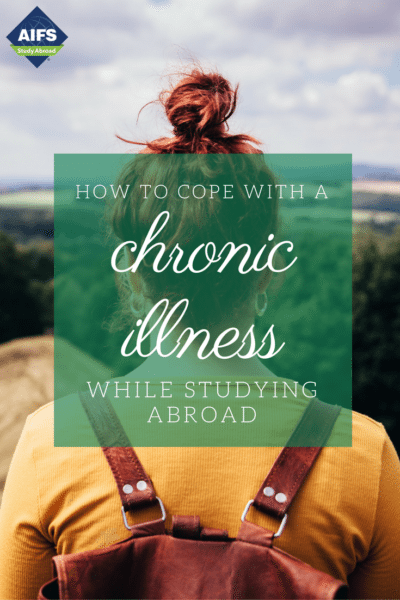I have fibromyalgia. I have had it for nearly 4 years, but was just recently diagnosed. Fibromyalgia is a condition characterized by chronic pain all over the body. Mine is localized in my head, neck and shoulders (for now). Fibromyalgia is called an “invisible illness,” which means it’s a condition that people can’t see. You can see broken bones and when someone has the flu but with invisible illnesses, the person looks “normal.” They don’t look sick but are suffering just the same.
There are many who would think that their medical circumstances would limit them from studying abroad.
Now, my condition isn’t as complicated as other diseases can be so I know this won’t apply to everyone, but I hope it will be helpful for those of you who are in similar situations.
I studied abroad with AIFS at The University of Limerick, in Limerick, Ireland in 2016. I was there for an entire semester and traveled all around Ireland and Europe (Northern Ireland, England [3 times], France and Rome).
Make sure to talk with your doctor about the feasibility to go abroad. I was going to be okay with not seeing my doctor for four months, but some people might not be able to do that. If that’s the case, maybe the summer or interterm programs are for you. If this is really what you want to do, you will be able to find a way to study abroad.
Going Abroad with Medications
When I was abroad, I was on three different prescription medications. Things got complicated and expensive because it was the beginning of the year and hadn’t even made a dent in our deductible. We ended up being able to apply the cost of these medications toward our deductible so it worked out in the end.
Keep in mind that some countries will not fill prescriptions that are written in the US.
I’m going to speak as if you were doing a semester program. Check and see how many refills are left on your prescriptions. I would suggest making sure you have at least five left. If you don’t, call you doctor and let them know you are going abroad and ask for some more refills. Once you have enough refills on all your medications, call you pharmacy 2-3 weeks before the day you leave. I know this sounds early. I was told to call one week before I left and we barely had time to get everything due to an insurance hiccup, so that’s why I recommend a big time frame. Make sure to get enough to cover your entire time abroad. I would also recommend having enough to cover for the first few days you are back. You don’t want to be making a pharmacy run while jet lagged.
I didn’t have any difficulty traveling abroad and around with my medications. I always kept them in my carry on bag instead of my suitcase. I did this because I always knew where they were. Also, if my suitcase were to be lost, I would still have my meds which are really important. I didn’t take any written prescriptions with me to prove that they were mine; my name being on the bottle was good enough. No one asked about them when I went through security. The most complicated part of the whole process was just getting enough to cover all the time I would be gone.
Don’t Let Your Condition Hold You Back
Whether you have had your diagnosis for a while or it’s recent, it’s essential to learn to not let your condition hold you back. You’ve probably been told this a million times and it can be a hard thing to do. If you want to go on a trip, go on your trip. Don’t worry about how you are going to feel that day. Even if you end up having a bad day, at least you are having a bad day in London or Paris or Barcelona.
Handling the “Bad Days”
My personal mantra is to power through. I know it sounds cheesy and difficult to do, but you just have to take it one minute at a time. You just power through this day and then it will be over. Just take it a few moments at a time. Set goals for yourself. Get through this class. Get through dinner. Then you are in bed and you’ve done it.
There will always be those days when it’s an 8 or 9 out of 10 on the pain scale and there’s just no way you can go to class or go do what you planned for the day. Forgive yourself. Treat yourself like you would at home. Don’t put extra pressure on yourself to have fun or go to class just because you are abroad.
Your Support System
You may have your support system back home but it’s going to be hard to stay in constant contact with them. The time change is going to be hard and if your people don’t have wireless internet at work or home or a low data plan, it’s going to be a challenge to FaceTime/Skype with your people. You, of course, can still be in contact with your American people but it’s nice to have people immediately where you are.
I do understand not wanting people to know. Many people at my home university don’t even know about my condition. I think only one person knew about my fibromyalgia when I was abroad, and that was my on-site staff Resident Director, Elaine. So even though I said to have a support system, it doesn’t need to be big. It was just one person, in the same time zone, who knew what was generally going on and that I might need some emotional support every now and then. I didn’t, and still don’t, want to tell everyone about my condition. It’s nice to make a few close friends that can be there for you when you are having a bad day. They don’t need to know everything that’s going on but just someone that will sit and eat food and watch a movie with you.
This post was contributed by an AIFS alum who studied abroad in Limerick, Ireland who preferred to remain anonymous.

